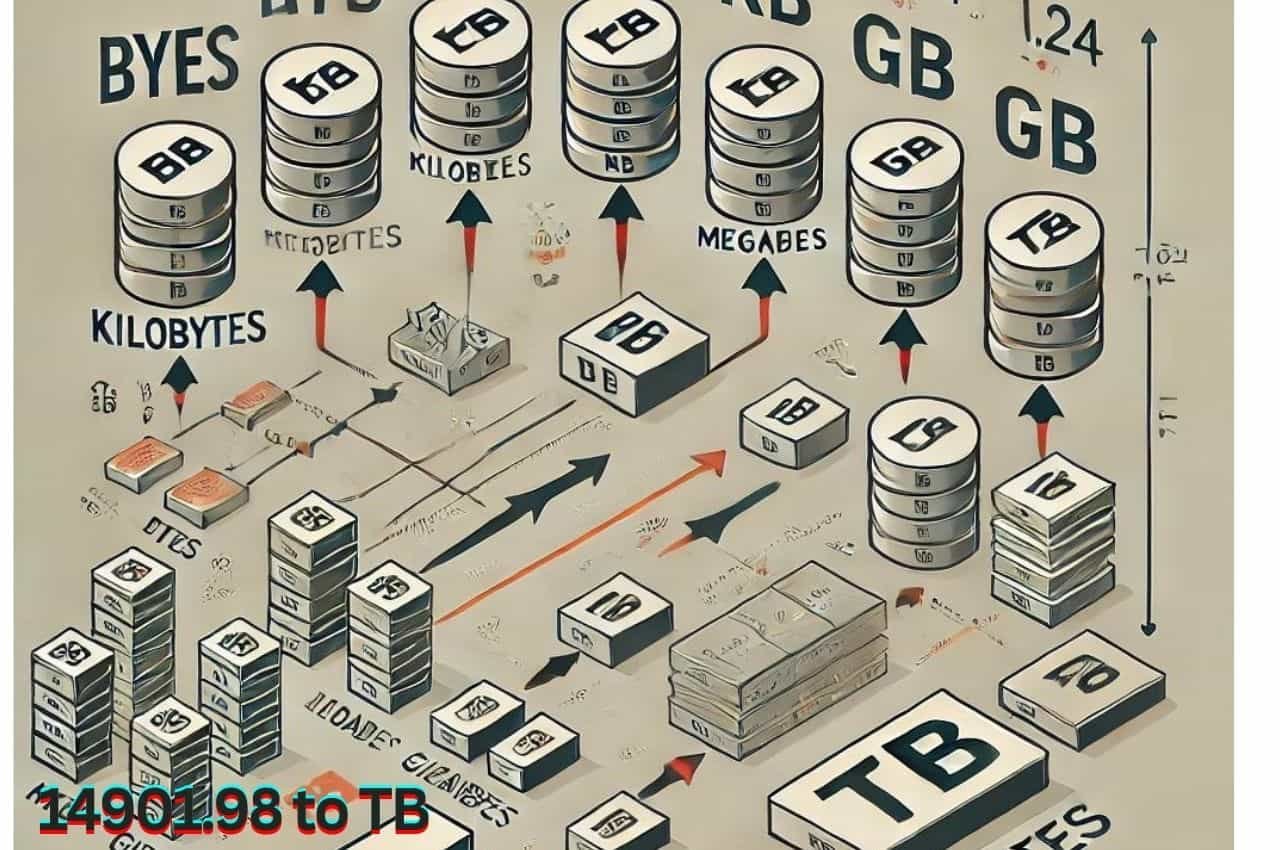In today’s digital age, managing and understanding storage space is essential.
Whether you’re dealing with cloud storage, hard drives, or data centers, you’ll frequently encounter terms like bytes (B), kilobytes (KB), megabytes (MB), gigabytes (GB), and terabytes (TB).
When working with data storage, it’s crucial to know how to convert different values into terabytes, especially if you’re working with large amounts of data.
One common conversion question is how to convert 14901.98 into TB.
This article will guide you through this conversion process, break down storage units, and clarify any confusion around these terms.
By the end of this article, you will clearly understand how to convert storage units and how 14901.98 converts into terabytes.
Understanding Digital Storage Units
Before diving into the actual conversion, it’s essential to understand how digital storage works. Digital data is typically measured using the following units:
- Bytes (B): The smallest unit of digital information, consisting of 8 bits.
- Kilobytes (KB): One kilobyte equals 1,024 bytes.
- Megabytes (MB): One megabyte equals 1,024 kilobytes (1,024 × 1,024 bytes).
- Gigabytes (GB): One gigabyte equals 1,024 megabytes.
- Terabytes (TB): One terabyte equals 1,024 gigabytes.
To convert between these units, you multiply or divide by 1,024, depending on whether you are converting from a smaller unit to a larger unit or vice versa.
The Process of Converting 14901.98 Bytes to Terabytes
When you encounter a value like 14901.98, it is crucial to understand which storage unit you are starting from. Let’s assume 14901.98 is in bytes (B).
If we want to convert this value into terabytes (TB), we must first convert bytes to terabytes step by step, moving through kilobytes, megabytes, and gigabytes.
Conversion Formula:
To convert bytes into terabytes:
1 TB=1,0244 bytes1 \, \text{TB} = 1,024^4 \, \text{bytes}1TB=1,0244bytes
So, the formula becomes:
Terabytes (TB)=Bytes (B)1,0244\text{Terabytes (TB)} = \frac{\text{Bytes (B)}}{1,024^4}Terabytes (TB)=1,0244Bytes (B)
Let’s break down the step-by-step process of converting 14901.98 bytes into terabytes.
- Convert Bytes to Kilobytes:
- 14901.98 bytes ÷ 1,024 = 14.55 KB
- Convert Kilobytes to Megabytes:
- 14.55 KB ÷ 1,024 = 0.0142 MB
- Convert Megabytes to Gigabytes:
- 0.0142 MB ÷ 1,024 = 0.0000139 GB
- Convert Gigabytes to Terabytes:
- 0.0000139 GB ÷ 1,024 = 0.00000001359 TB
Therefore, 14901.98 bytes equals approximately 0.00000001359 terabytes.
Alternate Interpretations: 14901.98 in Other Units
Since the unit for 14901.98 is not explicitly mentioned, let’s explore the possibility that 14901.98 might represent other storage units, such as kilobytes, megabytes, or gigabytes. This will help provide a more comprehensive understanding of how to handle different cases.
- If 14901.98 is in Kilobytes (KB):
- First, convert KB to MB:
- 14901.98 KB ÷ 1,024 = 14.55 MB
- Then, convert MB to GB:
- 14.55 MB ÷ 1,024 = 0.0142 GB
- Finally, convert GB to TB:
- 0.0142 GB ÷ 1,024 = 0.0000139 TB
- First, convert KB to MB:
- Thus, 14901.98 KB equals 0.0000139 terabytes.
- If 14901.98 is in Megabytes (MB):
- Convert MB to GB:
- 14901.98 MB ÷ 1,024 = 14.56 GB
- Convert GB to TB:
- 14.56 GB ÷ 1,024 = 0.0142 TB
- Convert MB to GB:
- Therefore, 14901.98 MB equals 0.0142 terabytes.
- If 14901.98 is in Gigabytes (GB):
- Convert GB to TB:
- 14901.98 GB ÷ 1,024 = 14.56 TB
- Convert GB to TB:
- In this case, 14901.98 GB equals 14.56 terabytes.
Why Is Conversion Important?
In an era where data is constantly being created, consumed, and transferred, understanding storage units and conversions is critical. Here are a few reasons why:
- Data Management: Whether managing cloud storage or your personal computer’s storage, understanding storage units ensures efficient data management and space optimization.
- Cost-Effective Storage Solutions: Many cloud storage services charge based on storage space usage. Converting and understanding units like GB or TB can help you determine how much space you need and what pricing plan is right for you.
- Handling Large Data Sets: In industries like AI, big data, and video production, data sets can reach terabytes or petabytes. Understanding how to convert smaller units like bytes or kilobytes into larger units like terabytes is crucial when working with such large data sets.
- Technical Accuracy: Whether you are a system administrator, developer, or end-user, understanding how much storage you are dealing with helps you make informed decisions about data storage, backup, and processing.
Frequently Asked Questions (FAQs)
- What is the largest unit of digital storage?
The largest standard unit of digital storage is the yottabyte (YB), which is 1,024 zettabytes (ZB). However, petabytes (PB) and exabytes (EB) are more commonly used in enterprise-level data storage.
- How many terabytes is 1 petabyte?
One petabyte equals 1,024 terabytes.
- Why do we use 1,024 and not 1,000 for conversions?
In computing, storage is calculated using the powers of two. This is why 1 KB equals 1,024 bytes instead of 1,000 bytes. The same principle applies to other units like MB, GB, and TB.
- How much storage is 1 terabyte?
One terabyte (TB) is equivalent to 1,024 gigabytes (GB) or approximately 1 trillion bytes (1,099,511,627,776 bytes to be exact).
- What is the practical use of terabytes?
Terabytes are commonly used to measure the storage of large files such as high-definition videos, large software applications, and backups for enterprise servers.
Conclusion
Converting units like 14901.98 to TB is a straightforward process once you understand the hierarchy of storage units.
Whether the value is in bytes, kilobytes, megabytes, or gigabytes, following the conversion process outlined above will help you determine its equivalent in terabytes.
In the case of 14901.98 bytes, it converts to 0.00000001359 terabytes.
However, if 14901.98 is in a larger unit like kilobytes, megabytes, or gigabytes, the result would vary as discussed.
Being familiar with these conversions can help you make informed decisions about storage needs, manage data more efficiently, and avoid any confusion when working with large amounts of digital information.
